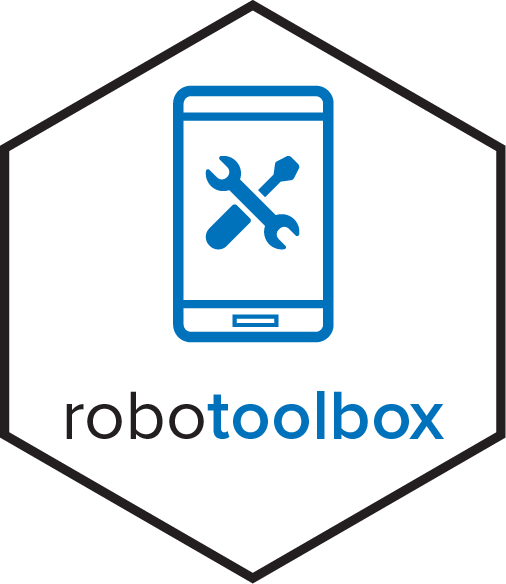robotoolbox is an R client to access and manage data from KoboToolbox, a powerful tool for collecting and analyzing data in challenging environments.
Features
- Easy authentication with KoboToolbox API
- List and access KoboToolbox assets
- Retrieve and process survey submissions
- Handle multi-language survey forms
- Work with repeating groups in survey data
- Process spatial data from KoboToolbox
- Access and analyze audit logging data
- Download media attachments
robotoolbox: A quick tutorial
The robotoolbox package is a client to KoboToolbox API v2. You will need to set your API token and specify the KoboToolbox server URL. The easiest way to set up robotoolbox is to store the token and the URL in your .Renviron file, which is automatically read by R on startup.
Getting the API token
You can retrieve your API token by following the instruction in the official API documentation: https://support.kobotoolbox.org/api.html.
You can also get your token directly from R using the kobo_token function.
The following examples will utilize UNHCR KoboToolbox server url (https://kobo.unhcr.org/). You can replace this URL with https://kf.kobotoolbox.org/, https://kobo.humanitarianresponse.info/ or any other KoboToolbox server URL you typically use.
Setting up Your Session
You can either edit directly the .Renviron file or access it by calling usethis::edit_r_environ() (assuming you have the usethis package installed) and entering the following two lines:
Or use directly the kobo_setup function
You can check the settings using the kobo_settings function.
library("robotoolbox")
kobo_settings()
## <robotoolbox settings>
## KoboToolbox URL: https://kobo.unhcr.org/
## KoboToolbox API Token: xxxxxxxxxxxxxxxxxxxxxxxxxxWith the settings done, it is possible to list all assets (e.g surveys, questions, etc) for the account associated to the token and URL.
Accessing data
library("dplyr")
l <- kobo_asset_list()
l
# A tibble: 24 x 7
uid name asset_type owner_username date_created
<chr> <chr> <chr> <chr> <dttm>
1 b9kgvd… Proj_A1… survey xxxxxxxxxxxxx… 2020-04-27 20:34:23
2 aRFJMp… Proj_A2… survey xxxxxxxxxxxxx… 2020-04-27 21:21:12
3 a6qMG7… Proj_A3… survey xxxxxxxxxxxxx… 2021-05-25 16:59:08
4 azhrVs… Proj_A4… survey xxxxxxxxxxxxx… 2021-05-25 13:59:46
5 aReR58… Proj_A5… survey xxxxxxxxxxxxx… 2021-06-07 09:15:53
6 aWaoqy… Proj_A6… survey xxxxxxxxxxxxx… 2021-05-29 10:46:09
7 aABU3C… Proj_A7… survey xxxxxxxxxxxxx… 2020-11-28 15:00:10
8 aaznyX… Proj_A9… survey xxxxxxxxxxxxx… 2020-11-28 14:28:48
9 aCVr2Q… Proj_A9… survey xxxxxxxxxxxxx… 2021-05-25 13:30:24
10 aPxNao… Proj_A10… survey xxxxxxxxxxxxx… 2020-04-27 11:37:34
# … with 14 more rows, and 3 more variables:
# date_modified <dttm>, submissions <int>
glimpse(l)
$ uid <chr> "b9kgvd7AXQCmo5qyUOBEl", "aRfJMpTSGRLzZ…"
$ name <chr> "Proj_A1", "Proj_A2", "Proj_A3", "Proj_A…"
$ asset_type <chr> "survey", "survey", "survey", "survey", …
$ owner_username <chr> "xxxxxxxxxxxxxx", "xxxxxxxxxxxxxxx", "xx…"
$ date_created <dttm> 2020-04-27 20:34:23, 2020-04-27 21:21:1…
$ date_modified <dttm> 2021-06-17 01:52:57, 2021-06-17 01:52:5…
$ submissions <int> 2951, 2679, 2, 1, 0, 0, 287, 73, 0, 274,…The list of assets is a tibble, you can filter it to select the form unique identifier uid that uniquely identify the API asset you want to open. The function kobo_asset can then be used to get the asset from the uid.
uid <- l |>
filter(name == "proj_A1") |>
pull(uid) |>
first()
uid
## b9agvd9AXQCmo5qyUOBEl
asset <- kobo_asset(uid)
asset
## <robotoolbox asset> b9agvd9AXQCmo5qyUOBEl
## Asset Name: proj_A1
## Asset Type: survey
## Created: 2021-05-10 07:47:53
## Last modified: 2021-08-16 12:35:50
## Submissions: 941Now with the selected asset, we can extract the submissions using the kobo_submissions function. The kobo_data can also be used, it’s an alias of kobo_submissions.
df <- kobo_submissions(asset) ## or df <- kobo_data(asset)
glimpse(df)
## Rows: 941
## Columns: 17
## $ id <int> …
## $ start <dttm> …
## $ end <dttm> …
## $ today <date> …
## $ deviceid <chr> …
## $ test <chr+lbl> …
## $ round <date> …
## $ effective_date <date> …
## $ collect_type <chr+lbl> …
## $ covid_module <chr+lbl> …
## $ country <chr+lbl> …
## $ interviewer_id <chr> …
## $ respondent_is_major <chr+lbl> …
## $ consent <chr+lbl> …
## $ admin_level_1 <chr+lbl> …
## $ admin_level_2 <chr+lbl> …
## $ admin_level_3 <chr+lbl> …Multi-Languages Survey forms
robotoolbox uses the R package labelled to provide tools to manipulate variable labels and value labels. You can learn more about this here.
Repeating groups
Repeating groups associate multiple records to a single record in the main table. It’s used to group questions that need to be answered repeatedly. The package dm is used to model such relationship and allows you to safely query and join such linked data for your analysis. Learn more about it here
Spatial data
KoboToolbox provides three types of question to record spatial data: geopoint for points, geotrace for lines and geoshape to map close polygons. robotoolbox associates to each spatial column a WKT column. It provides a simple way to use it with various GIS software and R package for spatial data analysis. The sf package is the standard for spatial vector data handling and visualization. Learn more about it here
Audit logging data
KoboToolbox comes with a feature that records all activities related to a form submission in a log file. The audit logging metadata is useful for data quality control, security and workflow management. The kobo_audit function allow you to read KoboToolbox audit logs file. Learn more in the following vignette: Audit Data
I’m collecting data using ODK
OpenDataKit (ODK) is an open-source tool for collecting data. Similar to KoboToolbox, ODK utilizes the XLSForm standard for form creation. Both tools offer similar features and functionality, and data collected using KoboToolbox can be collected using ODK Collect as well.
If you are using ODK in conjunction with R, the ruODK package is an excellent resource. The ruODK R package served as the primary inspiration for robotoolbox and provides similar functionality for interacting with ODK data.
Meta
- Please report any issues or bugs.
- License: MIT
- Please note that this project is released with a Contributor Code of Conduct. By participating in this project you agree to abide by its terms.

